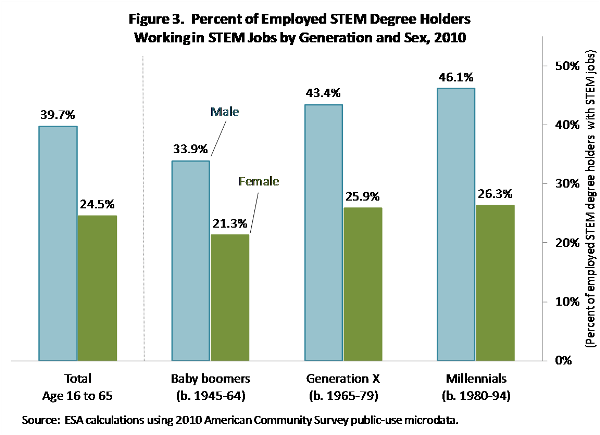STEM Degrees May Not Be As Valuable As You Think

“While employers argue that there are not enough workers with technical skills, most prior research has found little evidence that such workers are in short supply,” the study states. “This report uses the latest Census Bureau data available to examine the science, technology, engineering, and math (STEM) fields. Consistent with other research, the findings show that the country has more than twice as many workers with STEM degrees as there are STEM jobs. Also consistent with other research, we find only modest levels of wage growth for such workers for more than a decade. Both employment and wage data indicate there is no shortage of STEM workers in the United States.”
The Numbers Broken Down
Utilizing the most common definition of what a STEM job is, total STEM employment in 2012 was 5.3 million workers (immigrant and native), but there were 12.1 million STEM degrees in circulation (again, immigrant and native).
From the report:
Only one-third of native-born Americans with an undergraduate STEM degree holding a job actually work in a STEM occupation.
There are more than five million native-born Americans with STEM undergraduate degrees working in non-STEM occupations: 1.5 million with engineering degrees, half a million with technology degrees, 400,000 with math degrees, and 2.6 million with science degrees.
An additional 1.2 million natives with STEM degrees are not working — unemployed or out of the labor force in 2012.
Despite the economic downturn, Census Bureau data show that, between 2007 and 2012, about 700,000 new immigrants who have STEM degrees were allowed to settle in the country, yet at the same time, total STEM employment grew by only about 500,000.
Of these new immigrants with STEM degrees, only a little more than a third took a STEM job and about the same share took a non-STEM job. The rest were not working in 2012.
Overall, less than half of immigrants with STEM degrees work in STEM jobs. In particular, just 23 percent of all immigrants with engineering degrees work as engineers.
In total, 1.6 million immigrants with STEM degrees worked outside of a STEM field and 563,000 were not working.
The supply of STEM workers is not just limited to those with STEM degrees. Nearly one-third of the nation’s STEM workers do not have an undergraduate STEM degree.
Wage trends are one of the best measures of labor demand. If STEM workers are in short supply, wages should be increasing rapidly. But wage data from multiple sources show little growth over the last 12 years.
Real hourly wages (adjusted for inflation) grew on average just 0.7 percent a year from 2000 to 2012 for STEM workers, and annual wages grew even less — 0.4 percent a year. Wage growth is very modest for most subcategories of engineers and technology workers.
The numbers prove a few disturbing trends:
There may actually be a loss of jobs for Americans due to immigration. Going back to the key findings, the study’s authors write: “Despite the economic downturn, Census Bureau data show that, between 2007 and 2012, about 700,000 new immigrants who have STEM degrees were allowed to settle in the country, yet at the same time, total STEM employment grew by only about 500,000.” While it’s true that not all of these educated immigrants are working in the field, many are, and that leaves a gap shortage of around 200,000.
Whatever the government has done to “create jobs” the last eight years, it hasn’t been enough. When there are only half as many jobs as there are those with STEM degrees, and the education system continually encourages students to go after these types of degrees, that is a losing proposition through and through. The only way to overcomes said loss is to create more positions, but unfortunately, the demand within our nation’s borders, just isn’t there.
If you do get a STEM degree, the chances are very good that you’ll end up doing something unrelated. Whether you can make ends meet with it is another story, but the fact is, you won’t be utilizing your expertise. And sadly, because the “supply of STEM workers is not just limited to those with STEM degrees” and the fact that nearly “one-third of the nation’s STEM workers do not have an undergraduate STEM degree,” it means there is also a chance you’ll be missing out on that job to someone who doesn’t have the skills or education that you do.
To read the entire 7,000+-word report — complete with more facts, figures, tables, charts and diagrams — just click here.
It’s exhaustive and well worth your time, even though you may end up taking a while to get through it. If you’re currently locked in to a STEM degree program, then you absolutely, positively must read it.
In Summary
As you work through your schooling, it’s important that you find a balance between what you want to do in life, and what is most likely to get you hired. Until recently, the general body of educators — from teachers to policy-makers — have beaten the drum for STEM degrees and STEM job fields. However, this new study could blow the hinges off that common thought. That’s why it is important for you to take charge of your education and don’t wait for someone else to decide for you. How to do that?
First, pay attention to you. What are your likes and interests? What inspires passion within you, or what do you feel particularly good at? Don’t sit around waiting for the answer to hit you like a ton of bricks. Apply yourself. Try new things. Make note of what you like and what you don’t.
Secondly, pay attention to the world around you. By knowing what’s going on — particularly how policies and decisions influence the world you live in — you’ll be able to notice patterns and trends that will keep you out of go-nowhere degree plans.
Lastly, always be learning. Realize that your education doesn’t end at high school or with a bachelor’s degree. A master’s or Ph.D. won’t even get the job done. To be truly viable your whole life, you must commit to a lifetime of learning. Do these things, and you’ll be successful no matter what.
[Image via ESA.doc.gov]








